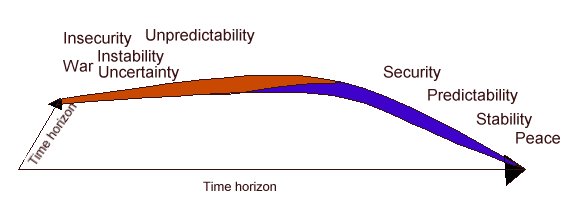
Bert hamminga Time, economics and business version date 990923 Goto: Questions
If, in a typical Western Academic classroom, I ask about the relation of "time", "economics" and "business", I am likely to get answers like:
time is money
time measures advance (over competitors)
time measures productivity
time measures the yield of investment (present value, pay back period)
time measures the cost of borrowing and the yield of lending
time is the dimension of any type of planning
These answers are a very good starting point to understand the Western
concept of time, and the conditions under which that concept does (and does
not!) work.
Consider an income-expenditure planning: You may expect to earn less than you
have to spend when you are young, more when you are middle aged, and again less
when you are old. So, you borrow when you are young, then, once you are middle
aged, you repay, and you continue, after repayment, with saving. Finally, when
you are old, you will spend your savings. Ideally, you may want to tune your
spending, borrowing en saving in such a way that your last pennies just pay your
funeral. So, you estimate your life time earnings, you estimate the interest
rate at which you will borrow, and later save, and you make you scheme of
spending such that at the end of your life, you will have spent all your money.
For those things in your life you feel unsure about (like unexpected illness,
and unexpectedly late date of demise), you make an insurance contract.

Now, this might even seem an exaggeration to Westerners, but mind you:
Western economists publish such models in their prestigious international top
journals!
The striking thing of such an extreme type of planning is the time horizon
of planning: some 80 years! Of course, this is only in abstract economic
models, but many types of decisions in Western countries take long time
horizons: mortgages last up to 30 years, and a 25 year old fresh master applying
for a job in the Netherlands will be informed about her or his pension build up.
A long time horizon is possible in a country where there is peace, security,
stability en predictability. The Netherlands is a perfect example of such a
country. What is means becomes clear when you consider the other extreme: a
situation of war, insecurity, uncertainty, instability, unpredictability. Most
Western people know about such situations only from the news media. Nowadays,
one may think of Congo, Kosovo, and East Timor. In such countries, people are
likely to have an extremely short time horizon. They cannot risk to make
themselves be dependent on what happens tomorrow, because the possibilities for
tomorrow are wildly different: you may have some luck or be dead. If you are
someone who has some means to invest in order to earn some money, you are not
likely to do so. Instead, you will buy valuables that can be hidden efficiently,
and easily be taken on the run and you will wait and see what the next day will
bring. That is the left red extreme in the picture below. Most Western countries
are found in the extreme right blue.

This picture is a very intuitive, not really a scientific illustration. It is meant to be an exercise to structure the ideas you have formed about different countries in the world that you know.
The terms used in the time horizon illustration (peace, security, stability en predictability etc.) are partially overlapping. As main covering terms we can treat security and predictability.
Security
Security concerns first of all safety of your own life and that of your family, then health, which supposes safe food stocks, food supply, medicine, good living conditions (housing, hygiene). Safety is enhanced by wealth, (food)stock and means and capacities present and acquired to maintain them, such as ground for hunting, for grazing life stock, and for crop growing. These are all things Western people do not often think about, because nowadays they have a natural, and hence not consciously reflected supply of all these necessities. Western culture, both its economic thinking, its social philosophy, and its approach to science and technology is only possible because of the presence of all these kinds of security, and hence it is highly instructive for everyone who has to deal with other cultures to think about the influence that partial lack of security can have on thinking and action in other cultures.
Predictability
A second group of factors determining time horizon can be subsumed under
"predictability". In most Western countries predictions can be based on the idea
that some key factors (like income and prices of many kinds of commodities) will
not change a lot, or grow more or less exponentially with a
low percentage. Those types of stability are highly useful to those who
need data as input for planning. For example, if the inflation and interest rate
are stable and known, your savings will grow
exponentially at a known percentage. Such
considerations will allow you to make economic decisions as a consumer or
businessman. What will be your considerations if you are a consumer or a
businessman in the blue part of the time horizon illustration?
Another type of predictability does not concern the confidence in the system
you are part of, that is circumstances under which you make a decision,
say, for a contract like mortgage for a house or a loan for a business project,
but what will be the the effect of making the contract on the behaviour of the
other contract party: will they do what they sign for? What if they don't?
How can, in different countries, contract partners be judged for reliability,
how can reliability be secured, how can contracts be reinforced? We shall call
it confidence in your direct contract partners. This also differs
widely over cultures.
Go to: Questions Time, economics and business
[#planned additions: influence of wealth per capita and climate on time horizon]